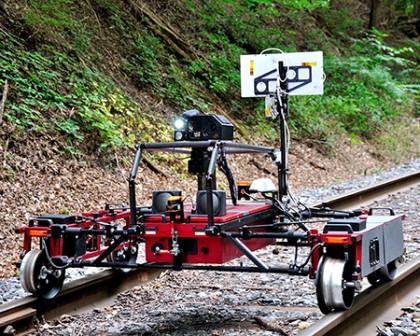A set of rail cars overturns on a stretch of remote track, a mile or more from the nearest access road. Chemicals or other hazardous materials may have spilled across the area, posing danger to the first observers to arrive on the scene.
Enter the Instrumented Rail Inspection System, or IRiS. Developed by researchers at the Johns Hopkins University Applied Physics Laboratory, IRiS is a remote-controlled, rail-riding vehicle designed to provide vital information to first responders and law enforcement personnel when railway incidents occur. IRiS can help them quickly assess the scene and avoid putting people into potentially dangerous situations by providing visual situational awareness and detecting hazards.

Image caption: Equipped with cameras and sensors, the Instrumented Rail Inspection System, or IRiS, can help first responders to quickly assess the scene of a railway incident and prevent putting people into potentially dangerous situations by providing visual situational awareness and detecting hazards
Image credit: JHU/APL
Equipped with visible and near infrared cameras, the system—which is about the size of an all-terrain vehicle—can serve as the eyes of the first responder. The unit can also accommodate an array of sensors that include chemical or radiation detection, making IRiS an ideal solution for first entry into active events such as rail accidents and bomb threats, according to members of the development team in APL's Asymmetric Operations Sector.
Operators can control IRiS remotely from a single, portable station that allows them to simultaneously maneuver the vehicle and review the telemetry from the cameras and sensors. And unlike larger, conventional inspection systems, IRiS can be placed on and taken off the track within minutes, greatly reducing the impact on scheduled rail services.
Funded by the Transportation Security Administration, IRiS was created through an iterative process in which APL engineers worked with transit agencies to assess their needs, and then used those requirements to design and build a prototype system with assistance from APL technicians, machinists, and materials experts. The two-year development also included several live tests in metro transit systems to demonstrate the capability of IRiS to operate effectively on the rails either above or below ground in transit tunnels.
APL recently entered into an agreement with the Harsco Corporation, whose Protran Technology unit will evaluate the feasibility of introducing the unmanned vehicle technology to traditional railway safety, security, and emergency operations.
Posted in Science+Technology







